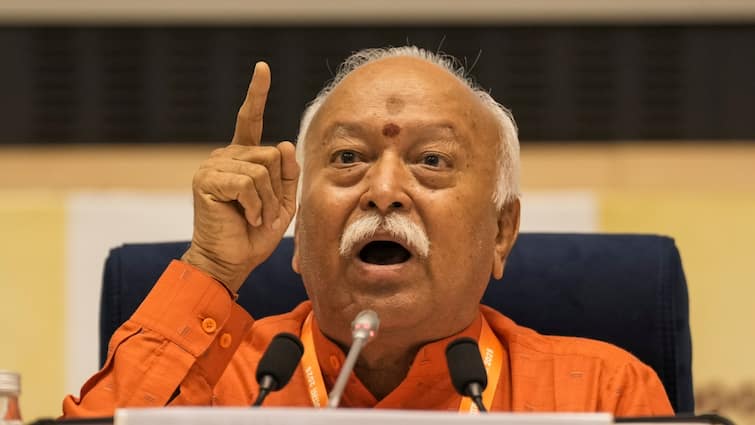RSS chief Mohan Bhagwat on Sunday urged India to take decisive action and called for deeper reflection amid escalating tensions between India and the United States over trade issues and H-1B visa regulations. He stressed that India must do whatever is necessary to overcome the ongoing situation, but should start by charting its own path based on “sanatan” view of development to shield itself from more problems in the future.
Addressing the rift, Bhagwat described the ongoing disputes as the inevitable result of a global system shaped by “a fragmented vision” and a long-standing focus on self-interest over the past two millennia.
“We can’t turn our backs on the situation. We must do whatever is necessary to get out of it well. But we can’t proceed blindly,” Bhagwat stated, emphasising the need for proactive engagement.
“So we need to chart our own path. We will find a way out… But inevitably, we will have to face all these things at some or other point in future again. Because in this fragmented vision, there is an ‘I’ and the rest of the world, or ‘we’ and ‘them’,” he added, while speaking at a book launch event in Delhi.
Bhagwat said that India should follow its age-old approach of four goals of life, which includes ‘artha’ (wealth), ‘kama’ (desire and pleasure), and ‘moksha’ (salvation) bound by dharma that “ensures that no one is left behind”.
He underscored that dharma is not merely a method of worship but a guiding natural law binding society together. “And the law that oversees all this is natural law, ensuring that no one is left behind. Follow it. Follow its discipline,” he urged.
The RSS chief then went on to recall a conversation he had with “a gentleman from America” three years earlier, where the prospects of Indo-US collaboration in security, counter-terrorism, and economic sectors were explored. Yet, the stipulation that American interests take priority surfaced repeatedly. He commented, “Everyone has different interests… So, conflict will continue. Then again, it’s not just the nation’s interests that matter. I also have an interest. I want everything in my hands.”
Reflecting on global dynamics, Bhagwat stated, “The one who is at the top of the food chain will eat everybody, and living at the bottom of the food chain is a crime.” He pointed out India’s strong track record in fulfilling environmental obligations, remarking, “Who else did? Because there is no authenticity.”
Bhagwat further highlighted India’s resilience and diplomatic maturity, saying, “If we had to fight in every confrontation, we would have been fighting continuously from 1947 to today. But we endured all this. We did not allow war to happen. …We have even helped those who opposed our policies at times.”
In his closing remarks, Bhagwat called on India to embrace its traditional yet ever-relevant outlook as it aims to become a ‘vishwaguru’ and ‘vishwamitra’—a global teacher and friend.
“Fortunately, our country’s outlook is traditional… This outlook on life is not old; it is ‘sanatan’ (eternal). It is shaped by the experiences of our ancestors over thousands of years,” he said.
Highlighting the role of dharma in balancing life’s ambitions with ethical discipline, Bhagwat concluded, “Our approach hasn’t cancelled artha and kama. On the contrary, it’s compulsory in life. The four goals of life include wealth and work. But it’s bound by Dharma”.
(With inputs from news agency PTI)



